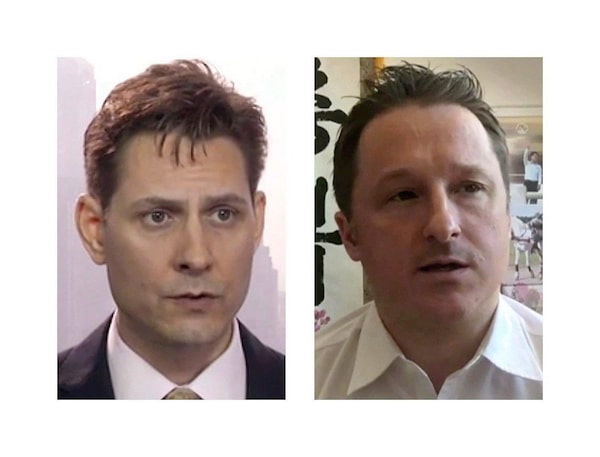
Michael Kovrig, left, a former Canadian diplomat, and entrepreneur Michael Spavor, right, were detained by the Chinese government in December, 2018, in response to Canada's arrest of Meng Wanzhou.�/The Associated Press
The judicial rejection of Huawei executive Meng Wanzhou’s attempt to avoid extradition is grim news for two Canadians held captive in China, and for their families.
Michael Kovrig, a former Canadian diplomat, and entrepreneur Michael Spavor were detained by the Chinese government in December, 2018, days after the detention of Ms. Meng by Canadian officials at the request of the United States government, which is seeking her extradition.
For almost a year and a half the two men have been held by Chinese authorities, pawns in a geopolitical game over which they have no control, with China unwilling and Canada unable to secure their release.
Mr. Spavor, who is being held in a crowded cell in Dandong, last saw Canadian consular officials on Jan. 13; Mr. Kovrig in a less-crowded cell in Beijing, on Jan 14. Shortly after, the Chinese government terminated consular access, citing the risk of transmitting the novel coronavirus, although access by telephone and video-conference has been prohibited as well.
At the best of times, a consular visit might last 30 minutes, held under close scrutiny. But in the past, this has at least permitted Canadian officials to press for improved food and for access to books and periodicals for the prisoners.
Visits by lawyers have also been halted, even though China has declared the pandemic largely vanquished, without a single new domestically spread case officially reported in three days.
The disappearance of even brief and sporadic contact has only underscored the monotony of the men’s lives, confined in detention facilities where little changes day to day, including the knowledge that they have yet to be formally charged with any crime.
They now have been incarcerated for 534 days, but the procuratorate, China’s prosecution service, has yet to decide whether to proceed with charges against them. Chinese law suggests that decision does not need to be made until sometime in June. With extradition proceedings now continuing against Ms. Meng in Canada, Chinese authorities are widely expected to proceed with those charges, locking the men into a formal judicial process in a country with a conviction rate in excess of 99 per cent.
In the meantime, the men have little choice but to maintain their regimented daily routines behind bars. Their sole contact with the world outside the detention centres comes from the books and family letters that authorities allow them to receive and, for Mr. Kovrig, a single phone call in March to his father, who “was seriously ill,” the Chinese foreign ministry said.
Had the judicial decision permitted Ms. Meng to return to China, the release of the two Michaels, as they are commonly known, might have been simply a matter of weeks. But now it is impossible to know when and by what means Canada might secure their freedom.
The Chinese government’s decision to strip Hong Kong of its protected status and allegations that the coronavirus pandemic was made worse through Chinese secretiveness have made the Chinese government less popular with Canadians by the day. The strain that has produced between the two countries has left few avenues for improved relations.
“Today’s ruling was not about Michael Kovrig and ought to have no bearing on his case," said Robert Malley, president and CEO of International Crisis Group, in a statement. Mr. Kovrig was working as an analyst for the think tank at the time he was apprehended.
Mr. Malley called the detention “a stain on China’s reputation,” adding, “Michael should not be held as a pawn in a case that has nothing to do with him" and reiterated the organization’s call "for China to do the right thing and release him immediately so he can rejoin his family and loved ones.”
If, as a result of the B.C. Supreme Court ruling, it could take months or years to decide the outcome of Ms. Meng’s extradition case, the future of the two Michaels appears no less uncertain.
A B.C. Supreme Court judge has ruled against Meng Wanzhou, saying the Huawei chief financial officer's extradition case should proceed.
The Canadian Press
Know what is happening in the halls of power with the day’s top political headlines and commentary as selected by Globe editors (subscribers only). Sign up today.